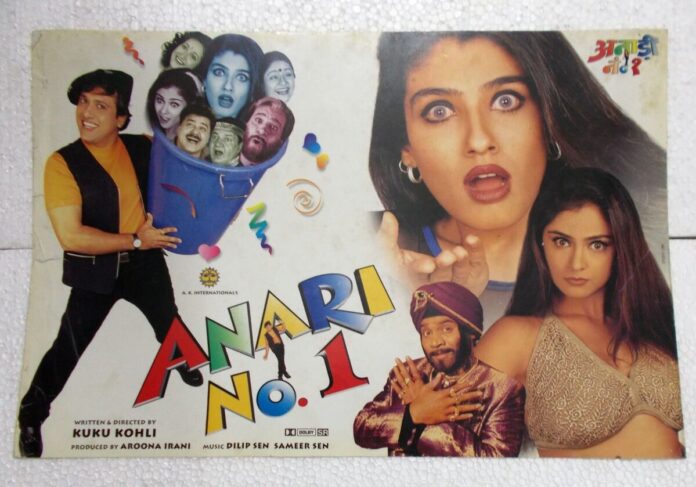ANARI NO. 1
A.K. International’s Anari No. 1 is a comedy film which has a fair dose of the crime angle too. A rich business tycoon has a look-alike who is a waiter in a hotel. The waiter kidnaps the tycoon, impersonates him (the tycoon) and enters his house with a view to rob a few lakh rupees. But the business tycoon’s mother is such a simpleton and loving lady that the waiter has a change of heart. Soon thereafter, the tycoon is kidnapped by a criminal seeking a hefty ransom, and it is the waiter who rescues him from the criminal’s clutches.
The film is quite a half-baked attempt at comedy. Several of the comic punches are childish and/or repetitive, and, therefore, do not have the desired effect on the viewer. The first half is somewhat better but the post-interval portion lacks the punch for the major part. The crime angle, especially, is boring and has been handled without finesse. Even the cinematic liberties are of the kind that would prompt the audience to think whether they were at all justified. For instance, the tycoon is kidnapped by the waiter but, rather than hiding him in a secluded or unknown spot, the waiter keeps him in a luxury van which itself is a stolen one. The van is one of its kind and would naturally be spotted by anybody. The confusion which the double role of Govinda creates in Kader Khan’s mind is hardly funny because it is too repetitive. Even the emotional angle looks contrived, given the comic flavour of the film. Dialogues should have been more punch-packed. Climax is weak; what’s more, important characters like the heroine, the hero’s best friend and the second heroine’s father are simply not seen in the end.
Govinda does well in a double role and makes some scenes hilarious with his sheer acting prowess. But even he has not been able to rise above the dull script. Raveena Tandon does well initially. She has no role worth a mention in the latter part. Simran is no match for the second Govinda and she manages to do just about a fair job. She exposes quite uninhibitedly though. Aroona Irani should have had a more substantive role. She performs ably. Kader Khan is not impressive at all. Satish Shah is natural to the core and complements Govinda ably. Shatru (Adi Irani) makes a weak villain. Prem Chopra, Himani Shivpuri, Ghanshyam, Sonia Sahni, Satyen Kappu and master Frank Anthony lend average support. Johny Lever, in a friendly appearance, is excellent. Piloo Wadia, Razzak Khan, Dinesh Hingoo and Dilip Sen are able.
If Kuku Kohli’s direction is quite good, his writing leaves plenty to be desired. The script of such a film proves two points — one, that it is not easy to make people laugh since comedy is a serious job; and two, brevity is the soul of wit. Several humorous scenes lose their impact if only because they are stretched too much. Further, the film, at several places, looks like a rush job. Music is too tapori in nature. ‘Dheere dheere’, ‘Kurta phaad ke’ and ‘Main hoon ladki kunwari’ are for the masses, but the upper class audience may not like the songs. Govinda is a delight to watch in the ‘Main hoon ladki kunwari’ song. Action scenes are fair. Camerawork is okay. Production and technical values are alright.
On the whole, Anari No. 1 may make the audience laugh at places but getting a smile on distributors’ faces is a far cry. It should definitely do a bit better in Bombay and the rest of Maharashtra.
Released on 9-4-’99 at Maratha Mandir and 21 other cinemas of Bombay by Vimal Agarwal thru R.M. Ahuja & Co. Publicity: very good. Opening: excellent. …….Also released all over. Opening was very good in C.P. Berar but not up to the mark in Delhi, Bengal, Bihar, C.I. and Rajasthan.
‘KKHH’ SILVER JUBILEE
Yash Johar’s Kuch Kuch Hota Hai completed 25 weeks of its run on 8th April. Written and directed by debut-making Karan Johar, the film stars Shah Rukh Khan, Kajol, Ranee Mukerji, Salman Khan (special appearance), Anupam Kher, Farida Jalal, Johny Lever, Archna Pooran Singh, baby Sana Saeed and master Parzan Dastur. Music: Jatin Lalit.
N.N. SIPPY FILES CONTEMPT PETITION AGAINST MPA, MAYAWALA, MISHRA
The Bombay high court on 7th April directed the Motion Pictures Association (MPA), Delhi, to register N.N. Sippy’s Silsila Hai Pyar Ka. Sippy had filed a contempt of court petition (no. 42 of 1999) against the conduct of the MPA in not registering his film till he settled the claims of Super Art International, Delhi. This, in spite of various orders passed by the high court in suit no. 1297 of 1995, restraining the MPA from implementing the resolution to not register Silsila Hai Pyar Ka until the claims of Super Art International were settled by Sippy. Justice B.N. Srikrishna passed the urgent order in the aforesaid contempt petition which will come up for admission on 19th April. Rajesh Mishra, proprietor of Super Art International, Delhi, the MPA, G.S. Mayawala (hon. general secretary of the MPA) and other office-bearers of MPA have been made parties in the contempt petition.
It is learnt that Silsila Hai Pyar Ka was finally registered by the MPA on 9th April.
PRODUCTION NEWS
‘Kohram’ Last Schedule
Following a 15-day schedule in Bombay till April 3, producer-director Mehul Kumar’s Kohram will now be shot in its last schedule from April 11 to May 5 at Chandivali Studios on a basti set and on locations in Jammu and Vaishno Devi. A song and the climax will be picturised. The entire cast will participate. The film stars Amitabh Bachchan, Nana Patekar, Jaya Prada, Tabu, Ayesha Julka, Mukul Dev, Mukesh Rishi, Danny and Jackie Shroff (in a special appearance). Kabir Bedi makes a guest appearance. Music: Dilip Sen Sameer Sen. Lyrics: Anand Bakshi and Dev Kohli. Dialogues: Iqbal Durrani. Cinematography: Rasool Ellore. Editing: Yusuf Sheikh. Art: R. Verman. Audiography: Jagmohan.
‘Hello Brother’ Unit Back From Mauritius
The unit of G.S. Entertainments’ Hello Brother returned from Mauritius on April 4 after completing a 20-day shooting stint. Two songs and climax scenes were picturised on Salman Khan, Arbaaz Khan, Ranee Mukerji, Johny Lever, Neeraj Vora, Razzak Khan and Shakti Kapoor. The film, now 75% complete, is being produced by Bunty Walia and Sohail Khan, and written and directed by Sohail Khan. Lyrics: Sudhakar Sharma, Faaiz Anwar and Jalees Sherwani. Music: Sajid-Wajid and Himesh Reshammiya.
DO YOU KNOW?
* Hinduja brothers, Srichand and Gopi, who finance films, top the list of the richest non-resident Asians in London. Their wealth is estimated at 1.3 billion pounds. On the third position is Subhash Chandra of Zee TV, whose wealth is estimated at 450 million pounds. The list of the 200 richest Asians in London was published this week.
* B.R. Chopra’s epic serial, MAHABHARAT, will now be dubbed in Gujarati and English too. Its Gujarati dubbing muhurt was held on 1st April. It has earlier been dubbed in Tamil, Telugu, Malayalam and Bhojpuri. The serial has been shown on/in BBC-London (twice), Mauritius (twice), Indonesia (twice), Nepal (twice), Thailand, East Africa, USA, Canada, West Indies, Malaysia and Iran (a Muslim country).
* Bappi Lahiri will make a special appearance in BOMBAY GIRLS.
* Smruti cinema of Nagpur is the only cinema in the whole of C.P. Berar to have collected over Rs. 1 crore (nett collections) in the financial year ended 31st March, 1999.
MPA: Most Painful Association
More and more producers are becoming disillusioned with the working of the Motion Pictures Association, Delhi. Besides the MPA’s rigid stand in the case of the registration of N.N. Sippy’s Silsila Hai Pyar Ka (read details elsewhere in this issue), yet another incident has been brought to our notice, which exposes the functioning of the Association.
Vijay Pal Singh, the Delhi-U.P. distributor of Manoj Kumar’s Jaihind, a while ago, pleaded inability to take the film’s delivery and asked to be relieved. The Acquiring Committee of the MPA opined that if Manoj Kumar would return the Rs. 5 lakh of Vijay Pal Singh to him within 10 days, no interest would be payable (by Manoj Kumar). Failure to make payment within 10 days would, however, make Manoj Kumar liable to pay interest.
Manoj Kumar and his new distributors, Magnum, returned the Rs. 5 lakh to Vijay Pal Singh within the prescribed time limit, but were shocked when, thereafter, the executive committee of the MPA asked them to pay interest also. No cognisance was taken of the fact that it was Vijay Pal Singh who was the defaulter, and not Manoj Kumar. The decision of the Acquiring Committee too was overlooked! Insiders reveal that the executive committee in general and G.S. Mayawala (hon. general secretary of the MPA) in particular decided in favour of making Manoj Kumar pay interest as, according to them, Manoj Kumar and Magnum could easily afford the burden of the interest whereas Vijay Pal Singh was in a financially bad shape and, therefore, the interest (of approximately Rs. 80,000) would be of great assistance to him.
If the financial backgrounds of persons rather than the merits of a case will decide who is to pay whom and how much, God save the producers from the clutches of the MPA and its crazy decisions! For, it is personal whims and fancies as well as prejudices that guide decisions there rather than rules which should be the same for everybody.
Distributors, Samjha Karo!
Both the films had hit music. Both were ‘hot’ before their release. And both the films starred Khans — one, Shah Rukh Khan, and the other, Salman. The end result of both the eagerly awaited films has been the same.
Like Dil Se.., last week’s Jaanam Samjha Karo is also all set to make holes in the pockets of its distributors. The producer of Jaanam Samjha Karo must be having the last laugh. And it must be one wicked laugh. For, he succeeded in getting all his distributors to hike the price after showing them the film!
This brings us to the question: How did the distributors agree to pay more after seeing the film? It had an apology of a story. Its screenplay was full of flaws. Perhaps, what the distributors got bowled over by were the songs and the presence of Salman Khan. Maybe, also the fact that a producer had the courage to show his product before asking for a price hike, must have made a difference. These days, producers keep their films under wraps but yet, insist on their distributors to increase the price at the time of release. The producer of Jaanam Samjha Karo acted differently and succeeded in his mission.
How differently do distributors view films in which they have a stake from, say, persons unconnected with the films or even from the audience? Perhaps, distributors, who have invested in a film, come to treat it as their ‘child’. And does anybody dislike his own child? Keeping a little distance from the ‘child’ would ensure that distributors don’t lose their objectivity. Actually, it is wrong for them to even treat a film they are distributing, as their baby. If at all, it is the baby of the producer and the director. For them, it is a product in which they deal. So why at all should they get so personal in the first place?
Had even one distributor remained objective in his judgement, he would not have hiked the price. Another area in which distributors err is in applying logic to gauge a film’s business potential. The only logic that can be applied to assess a film’s business is that it clicks if it is liked by the audience, and doesn’t, if it is not liked. All the other things are secondary. But what the distributors of JSK must’ve calculated is the craze for Salman Khan. What they must’ve also considered in judging the film’s potential is its hit music. They must have not overlooked the fact that it was soon going to be vacation time. But what they all forgot to consider is that all of the above considerations merit attention if and only if a film has intrinsic worth. If not, the above don’t matter much. Dil Se.. had, in recent times, proved it. And still the distributors of Jaanam Samjha Karo chose to ignore the lesson taught by Dil Se... They must now all be crying. But it’s too late!
– Komal Nahta
Cinema Controllers’ Condition: Cause For Concern
Cinema controllers are the worst hit these days. On the one hand are the huge rentals they are required to pay the landlords. And on the other, films doing so badly at the box-office that they often have to give some share to distributors even though films incur deficits. That is to say, controllers or weekly contractors have to fulfil their weekly obligations to landlords and, at the same time, cannot ignore the interests of distributors. As a result, many controllers are facing heavy losses in their business and are contemplating giving up control of cinemas.
The situation is as alarming in Bombay as in other circuits. The poor performance of films and their short run, coupled with a slow flow of releases, have made controllers press the panic button.
Metro, one of the most prestigious main cinemas of Bombay, has been forced to screen Hote Hote Pyaar Ho Gaya from 23rd April on percentage basis rather than on the usual theatre rental. Another main cinema of Bombay — Minerva — has been given up by its controllers (V.I.P.) and its bookings are now being done by the landlords themselves (Mehras). The weekly rent has resultantly come down by almost a lakh of rupees.
There is one controller of Bombay and Maharashtra, who is reported to be incurring a loss of almost a lakh of rupees every week. The case of Bombay’s Central Plaza, renovated recently at a heavy cost, is truly pitiable. The cinema has not been doing well despite the renovation and the latest sound system. It offered a heavy MG to the distributor of Jaanam Samjha Karo and with the film faring the way it is, the cinema now stands to lose heavily in this deal. Why, the film did not draw full houses in its very first week at the cinema.
The position of cinemas other than the main cinemas is no different. Cinemax, Jaya and Diamond cinemas of Bombay have been screening films which haven’t collected enough to even cover the rentals!
The percentage collections of various films in Bombay in the week from 2nd April to 8th April, 1999 are worth taking a look at:
Film Week Percentage
Jaanam Samjha Karo 1st 75.06%
Putlibai 1st 48.24%
Purnasatya 1st 27.67%
International Khiladi 2nd 37%
Kahani Kismat Ki 2nd 18.25%
Aarzoo 3rd 33%
Aaag Hi Aag 4th 26.74%
Lal Baadshah 5th 14.88%
Kaun 6th 31.46%
Kachche Dhaage 7th 31.24%
Daag The Fire 8th 28.70%
Hum Aapke Dil Mein …. 11th 37%
Bade Miyan Chote Miyan 25th 30.67%
Kuch Kuch Hota Hai 25th 26.15%
Of course, the week was not exactly the best because examinations of schools and colleges were on and there was also the opposition of cricket matches. In some parts of the country, the terrible summer heat also adversely affected collections in the afternoon shows.
But if the box-office scenario doesn’t look up soon, tougher times are ahead for controllers. Are they heading for a catastrophe?
– Gautam Mutha
COMMENTS
O.P. BANSAL (Rajsthan distributor)
We conveniently blame the public for not patronising cinemas when, actually, the fault lies with our films and their prices, with theatre rentals and admission rates.
FIROZ NADIADWALA (Producer)
Unless a film is a major hit, distributors never give overflow to producers. ‘Overflow’ actually means that the flow (of funds) is over.
MADHUMALTI (Bombay distributor & Marathi film producer)
High admission rates in cinemas are killing the industry. People prefer visiting hotels to cinemas because they know that new films can be seen free on cable TV and satellite channels after some weeks of their release. The scene is so bad that I am afraid to produce a film. If the public is not coming to see Hindi films, how will they be keen to see a Marathi film?
RAMESH RAIKER (Bombay-Karnataka distributor & exhibitor)
If I, as an exhibitor, can survive the coming two months in the face of opposition of World Cup cricket and poor flow of releases, I can safely hope to survive for the next 20 years.
BRIJESH TANDON (U.P. cinema controller & Delhi-U.P. distributor)
The response among exhibitors to my BIWI NO. 1 is simply fantastic. The terms I am being offered are mind-blowing and, at places, comparable to those of KKHH. Equally fantastic is the publicity material of the film.
VIMAL AGARWAL (Bombay distributor)
Theatres the world over don’t charge rentals. The system of rentals exists only in India. In other countries, films are screened in cinemas on percentage basis.
3-E
Education-Entertainment-Enlightenment
High Admission Rates Prove Suicidal
While cinemas of Aurangabad realised the importance of reasonable admission rates and brought down their rates one by one, the C.I. distributor of Jaanam Samjha Karo seemed to have burnt his fingers on the count of admission rates itself. Since the tax-free service charge of Re. 1 per ticket was to come into effect in the state of Madhya Pradesh from 1st April, the distributor of JSK decided to hike admission rates by further Rs. 4 in the hope that the paying public would be led to believe that the entire hike was prompted by governmental action. But the tax-free service charge did not become operative from 1st April. Therefore, the hike of the entire Rs. 5 per ticket was due to the distributor’s action. Result: the film did not command even a decent initial in C.I. Yet another pointer to the harm which high admission rates can do to a film.
Looking Before Leaping
While on the topic of admission rates in cinemas, it would not be out of place here to mention that the dull opening of several films these days is also sometimes due to the high rates of admission. Since rates are quite prohibitive, middle-class and lower middle-class audience wait for a film’s reports to be out, before they visit a cinema to see it. When admission rates were more affordable, it was a different story, but now, one has to think twice before going to a cinema. As a cinegoer quipped, “When a consumer asks the rates of vegetables to three vegetable vendors before buying them, how can you expect him to rush to a cinema on the first day itself? And the rates of vegetables are Rs. 20 to 25 per kg. while cinema tickets for a family of five or six can cost up to Rs. 200!”
Guddu’s Good Deed
In last week’s issue, we had carried a news item of famous qawwali singer Naseem Bano’s plight and how producer-director Guddu Dhanoa planned to pay her a visit. Well, Guddu did pay the legendary singer a visit on 3rd April and was moved to tears on seeing her living in the staircase of a building at Antop Hill, Bombay. He shifted her to hospital that very moment, and the singer is now undergoing treatment for paralysis. Guddu’s good deed went unnoticed when a leading Bombay newspaper incorrectly reported that Maharashtra’s cultural affairs minister, Pramod Navalkar, had got the singer admitted to Guru Nanak Hospital. But, as Guddu puts it, “Who gets the credit is not important. What is important is that Naseem Bano is now being looked after.”
Hollywood Versus Bollywood
Imagine Subhash Ghai showing the trial of his under-production film, Taal, to Yash Chopra, Rajkumar Santoshi, Rakesh Roshan, Shekhar Kapur, Sooraj Barjatya, Dharmesh Darshan, Aditya Chopra, Karan Johar, Raj Kanwar etc. Or Sooraj showing his current venture, Hum Saath Saath Hain to 10 other directors. Unimaginable, isn’t it? But that’s what Hollywood’s George Lucas did. He showed his under-production Star Wars: Episode 1 – The Phantom Menace to friends Steven Spielberg, Ran Howard, Francis Ford Coppola, Martin Scorsese, Brian De Palma, Frank Darabont and Larry Kasdan. Most of his friends hadn’t liked his first Star Wars. After releasing his current film on 19th May, George Lucas will start writing the script of his next Star Wars film which will begin in June 2000.






























